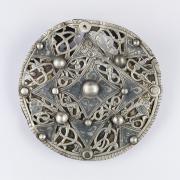Rachel Mead meets 91-year-old Wesley Wyatt, who has been farming near Wiveliscombe for seven decades. He has seen huge changes in the way farming is done during his lifetime and experienced highs and lows along the way
I knew from the moment that I stepped out of my car that I was at the right place for Wesley Wyatt’s book launch because the air was carrying with it a delicious smell of home cooking. The location was the Wiveliscombe Rugby Club and the friends and family of this nonagenarian farmer were, as one knows if you have ever attended an event run by the farming community, putting on a jolly good spread to celebrate. The hustle and bustle expected with a village gathering was taking place, tables and chairs were being organised, cream and jam were being arranged on scones whilst the most aromatic sausage rolls were baking in the oven, and suspensefully, at the front of the room, was a large stack of books and two seats poised for a live Q&A conversation. God Speed the Plough, released earlier this year, documents over ninety years of Wesley’s life as it takes you on a journey through his boyhood in Somerset, but more crucially, recounts the incredible highs and sometimes terrible lows of his seventy years’ experience of farming in our county.

The book launch, eagerly anticipated for by the hundred-strong crowd, was hosted by Anthony Gibson OBE who coincidently encouraged Wesley to share his tale, and in doing so wrote the book’s introduction. ‘For all his farming achievements, Wesley is no gentlemen farmer with all the connotations of that label. He is a working farmer who affects no airs and graces…what he most certainly is, is a gentlemanly farmer.’ After his introductions, Anthony handed the microphone over to Wyatt’s publisher, Stephen Chalke, who, for fear of giving away any spoilers, expertly manoeuvred the conversation to whet the appetite of the keen audience with hints of thrilling farming stories which could be discovered in more depth on reading the book!

Wesley, a modest author if knowledgeable farmer, initially appeared to be overcome by all the attention, but as Stephen continued to highlight some of the anecdotes, Wesley openly shared his memories with the roomful of his contemporaries. ‘Whilst away at boarding school, it was quite a shock to receive a letter from my father telling me that my grandfather had left the farm to me in his will. At the age of 18, in the midst of taking my School Certificate, it seemed that I didn’t have much choice but to return to the farm and make the best of it.’ It didn’t take long for Wesley to become ‘the boss’ making momentous changes across the farm whilst heeding the advice from experienced and successful farmers each Monday evening down the White Hart in Milverton. Within three years, Wesley was Chairman of Wiveliscombe Young Farmer’s Club where more skills in stock-judging, ploughing and hedge-laying were harnessed, and his development as a farmer was deepened.

As glasses of fizz and more canapes were passed around the room, the audience heard how the book will take them chronologically through Wesley’s first hand experiences on the farm. We were told to expect tales of immense despair, such as the loss of over 50 pregnant ewes in a snow storm, whilst also informed that there are incredible highs too, such as the time when Wesley was judged as the ‘Best large farming business in Somerset’ for two consecutive years. The story portrays an insider’s honest view as to how a farmer often makes decisions with his land based on government guidance and subsidies. There are details shared from previous eras where hedges were removed and ‘the farm resembled a prairie’ (and incidentally caught alight by a spark from a passing steam train) to tales of more recent times where hedges are now being replanted. Wesley Wyatt’s book reflects the changes in agricultural policy which have had a transformational effect on turning a traditional farm of corn and beef into an intensive farming business before pivoting again and putting conservation at the forefront. As the Q&A drew to a close, Wesley concluded that ‘farming isn’t an easy life but I’ll forever remain an optimist!’ to which Stephen remarked that Wesley’s story has been ‘one of unpredictable endeavour written by one of the most distinguished farmers in the West Country and, by the most perfect gentleman’ to which the crowd raised their glasses and erupted into chants of ‘Hear! Hear!’
You can buy your copy of God Speed the Plough by Wesley Wyatt at: anthonygibsonbooks.co.uk





























